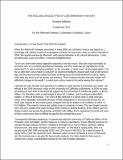| dc.contributor.author | Williams, Rosalind H | |
| dc.date.accessioned | 2017-03-23T16:38:30Z | |
| dc.date.available | 2017-03-23T16:38:30Z | |
| dc.date.issued | 2012 | |
| dc.date.submitted | 2011-09 | |
| dc.identifier.isbn | 9780199658411 0199658412 | |
| dc.identifier.uri | http://hdl.handle.net/1721.1/107660 | |
| dc.description.abstract | When the Aftermath Network assembled in early 2009, our scholarly mission was based on a seemingly self-evident model of contemporary history. An economic crisis occurred in the fall of 2008. We would examine its aftermath, with special attention to its cultural dimensions. Crisis and aftermath, cause and effect: it seemed straightforward. | en_US |
| dc.language.iso | en_US | |
| dc.publisher | Oxford University Press | en_US |
| dc.relation.isversionof | http://www.worldcat.org/title/aftermath-the-cultures-of-the-economic-crisis/oclc/780333082 | en_US |
| dc.rights | Creative Commons Attribution-Noncommercial-Share Alike | en_US |
| dc.rights.uri | http://creativecommons.org/licenses/by-nc-sa/4.0/ | en_US |
| dc.source | Prof. Rosalind Williams via Michelle Baildon | en_US |
| dc.title | The Rolling Apocalypse of Contemporary History | en_US |
| dc.type | Article | en_US |
| dc.identifier.citation | Williams, R. "The Rolling Apocalypse of Contemporary History". In M. Castells, J M. G. Caraça, and Gustavo Cardoso (Eds.). Aftermath: The Cultures of the Economic Crisis. Oxford: Oxford University Press, 2012. | en_US |
| dc.contributor.department | Massachusetts Institute of Technology. Program in Science, Technology and Society | en_US |
| dc.contributor.approver | Williams, Rosalind H | en_US |
| dc.contributor.mitauthor | Williams, Rosalind H | |
| dc.relation.journal | Aftermath: The Cultures of the Economic Crisis | en_US |
| dc.eprint.version | Author's final manuscript | en_US |
| dc.type.uri | http://purl.org/eprint/type/BookItem | en_US |
| eprint.status | http://purl.org/eprint/status/NonPeerReviewed | en_US |
| dspace.embargo.terms | N | en_US |
| dc.identifier.orcid | https://orcid.org/0000-0002-2744-0116 | |
| mit.license | OPEN_ACCESS_POLICY | en_US |
